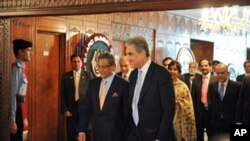Foreign Ministers of India and Pakistan have concluded their much awaited daylong talks in Islamabad without announcing any tangible steps to build the trust shattered by the Mumbai terrorist attacks.
Speaking at a late night news conference after the meeting, Pakistani Foreign Minister Shah Mehmood Qureshi and his Indian counterpart S.M. Krishna described the discussions as useful, constructive and positive, saying they have also agreed to hold more meetings in future.
But the two foreign ministers were unable to report any significant progress on building the trust fractured by the November 2008 terrorist attacks in Mumbai.
Indian Foreign Minister Krishna, however, said Pakistan has promised to pursue new leads in the attacks to bring the culprits to justice.
"If it could help to unravel the conspiracy and if it could help in trying to go after the perpetrators of the Mumbai attack perhaps
Pakistani foreign minister Qureshi reiterated his country is making all possible efforts to help India investigate the Mumbai attack. He said that authorities have arrested and put on trial seven suspected militants in connection with the incidents but Pakistan needs more evidence from India to seek convictions.
"There are certain procedures that have to be undertaken secondly as you know in Pakistan like India, judiciary is independent and we have to respect that," said Shah Mehmood Qureshi.
A day before the meeting between the two foreign ministers, a top Indian official in New Delhi in a published statement accused Pakistan's main intelligence agency, the ISI, of coordinating and controlling the Mumbai attacks.
Pakistani Foreign Minister Qureshi rejected the allegations as unhelpful for the peace process between Islamabad and New Delhi.
"The press statement of the Indian Home Secretary on the eve of this dialogue, we discussed it and we are both of the opinion that it is uncalled for," he said.
Indian foreign minister Krishna while addressing the news conference rejected allegations his country is fueling a separatist insurgency in Pakistan's southwestern Baluchistan province. In return, he alleged that the recent increase in violence in the Indian-ruled Kashmir is due to a 40-percent rise in infiltration by Islamic militants from the Pakistan-controlled part of the disputed region.
"These infiltrations are designed to create instability, to create restlessness in that part of India," he said. "We will certainly take note of these infiltrations we have taken note of these infiltrations and we are in our own way trying to thwart any attempts at destabilization."
But the Pakistani foreign minister instantly rejected the allegations.
"Infiltration is not the policy of the government of Pakistan or any intelligence agency of Pakistan, period," said Shah Mehmood Qureshi. "If there are individuals who have crossed over, deal with them firmly and Pakistan will cooperate."
Indian Kashmir has seen major pro-independence protests in recent weeks that left at least 15 people dead. Police firing on the demonstrators is said to have caused most of the deaths. The tensions provoked New Delhi to send in the army to control the violence.
India and Pakistan both claim Kashmir and have fought three wars over the disputed region.
Regional observers say Thursday's tense press conference of the two foreign ministers is a strong indication India and Pakistan are nowhere near resolving key disputes dividing the nuclear-armed South Asian neighbors.




